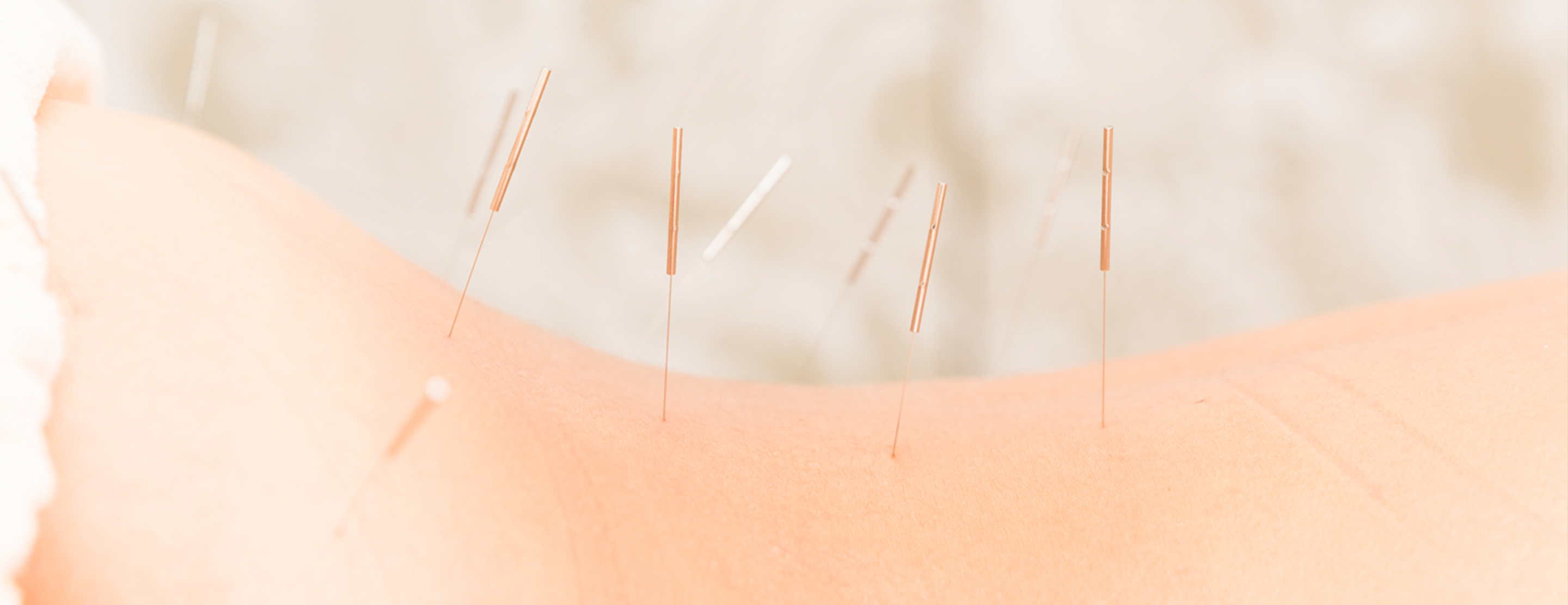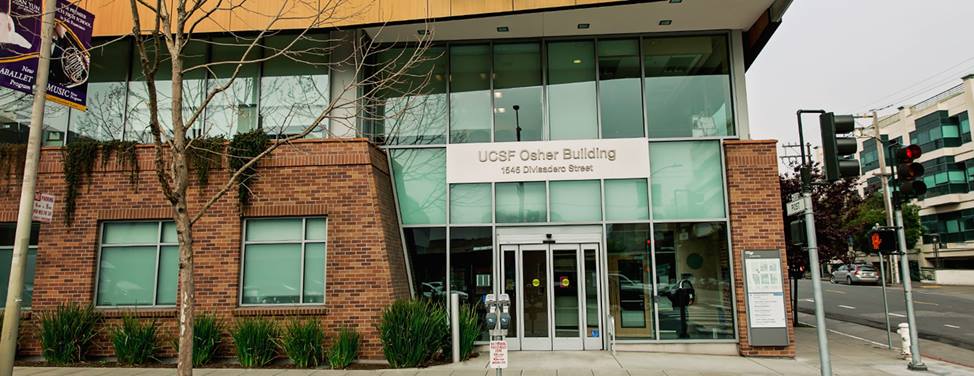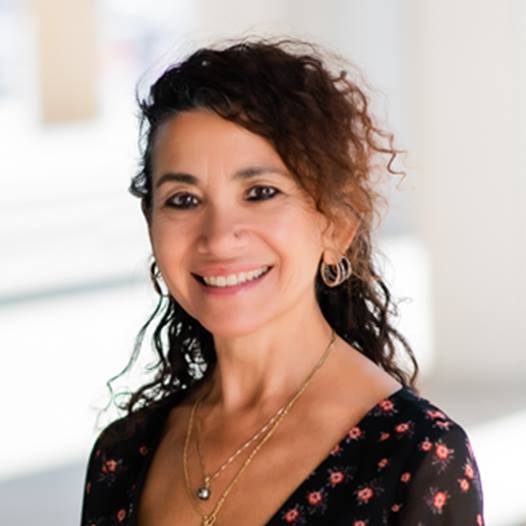Acupuncture has been used for more than two thousand years in China to promote well-being and treat illness. In Chinese medicine, health is believed to result from the free flow of energy, called chi, in the body. Illness is attributed to blockages in this energy flow, which can be relieved by the placement of thin needles at various points in the body.

Acupuncture
The UCSF Osher Center for Integrative Health offers acupuncture services to assist the treatment of various health problems. In addition, our licensed acupuncturists are trained in many other aspects of Chinese medicine, including herbal remedies, massage, counseling and nutrition. These experienced practitioners are trained to work with patients with complex medical conditions as well as healthy individuals who want to maintain wellness.
Conditions
Acupuncture can be helpful in maintaining good health and in treating patients with a wide range of health problems. Acupuncture may be used alone or in combination with other complementary or conventional medicine treatments.
If you are not sure whether acupuncture is an appropriate treatment for your condition, first schedule an integrative medicine consultation, where one of our specialists will go over the various services provided at the Osher Center for Integrative Health and help you figure out what might best fit your needs.
Acupuncture can be used to treat a number of condition and health problems, including:
- Side Effects of Cancer TreatmentAcupuncture can help ease the nausea associated with chemotherapy, increase the immune response, relieve pain and improve energy levels.
- HeadacheAcupuncture can help reduce the severity and frequency of chronic headaches, including tension headaches and migraines.
- Chronic Neck and Back PainAcupuncture may be helpful in relieving chronic pain caused by spinal stenosis, disc herniation, spondolithesis and ankylosing spondylitis.
- Women's Reproductive Health IssuesAcupuncture can be used to enhance fertility, relieve symptoms of premenstrual syndrome (PMS) and minimize bothersome symptoms of menopause, including mood changes, hot flashes and insomnia.
- Chronic Fatigue SyndromeChronic fatigue syndrome (CFS) is a disorder that causes debilitating fatigue, including exhaustion and reduced stamina, neurological problems, and a variety of flu-like symptoms.
Chinese medicine considers symptoms of fatigue and exhaustion as originating from weakened organs. Acupuncture may help to revive and stimulate the affected organs from their depleted states. - FibromyalgiaFibromyalgia is a chronic pain disorder characterized by fatigue and widespread pain in the fibrous tissues of the muscles, ligaments and tendons. Acupuncture may help relieve the pain associated with this condition.
- AsthmaResearch in the past decade has shown that acupuncture can be very effective in alleviating the symptoms of respiratory diseases, including asthma. It may also reduce the frequency and intensity of asthma attacks.
- Sports InjuriesAcupuncture can be used to treat various sports and repetitive stress injuries.
- Gastrointestinal DisordersAcupuncture may be helpful in relieving some of the discomfort caused by gastrointestinal disorders, including chronic liver disease, irritable bowel syndrome, gastroesophageal reflux disease (GERD) and inflammatory bowel disease.
Evaluation
You can make an appointment to see one of our acupuncturists directly, with or without a referral from your medical doctor. If you are uncertain about whether acupuncture may be right for you, consider scheduling an integrative medicine consultation as a first step in your treatment.
At your initial consultation, the acupuncturist will discuss your health concerns with you and determine how your symptoms can best be treated with acupuncture. He or she also may analyze your pulse, which is an important method of diagnosis. Six pulses are felt on each wrist, which correspond to your major organs and their function. Each pulse is located at a specific position on your wrist. Your acupuncturist may also observe your tongue, facial and body coloring, and skin temperature and texture on different parts of your body.
Treatment
Acupuncture is an ancient form of Chinese medicine based on the principal of chi, or energy flow. In the Chinese medicine framework, the free flow of chi throughout the body produces optimal health. Chi is believed to flow along twelve defined pathways, called meridians, which are connected to specific organs. If chi is blocked in any way, illness may result.
Acupuncture works to restore the flow of chi throughout your body by placing very thin, stainless steel, sterile needles at various points in your body. There are as many as 365 acupuncture points along the meridian pathways where needles can be inserted to restore a balance of energy.
During your treatment, your acupuncturist will first start by selecting points along the appropriate meridians, which will be cleaned with cotton that has been dipped in alcohol. Sterilized needles are then placed on the selected points. Acupuncture needles are different lengths and gauges, but are generally hair-thin, solid and made of stainless steel. Some acupuncturists may use pre-sterilized, disposable needles.
Typically needles are placed just below the skin's surface, but some may go deeper, depending on the points being treated. Usually, most patients only experience a brief sensation as the needle is first being placed. Once the needles are in place, they generally cannot be felt.
Many patients find the treatment very relaxing and experience a feeling of well-being. Often patients are surprised at how comfortable they are during the treatment and how easily the needles are placed. Needles typically stay in place for about 30 minutes; however, this may vary depending on your individual needs. After your acupuncturist removes your needles, your insertion points are gently cleansed with cotton that has been dipped in alcohol.
UCSF Health medical specialists have reviewed this information. It is for educational purposes only and is not intended to replace the advice of your doctor or other health care provider. We encourage you to discuss any questions or concerns you may have with your provider.







